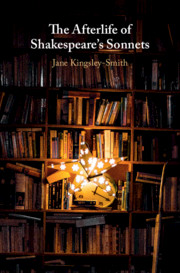Book contents
- The Afterlife of Shakespeare’s Sonnets
- The Afterlife of Shakespeare’s Sonnets
- Copyright page
- Dedication
- Contents
- Figures
- Acknowledgements
- Introduction
- Chapter 1 Loved When They Alteration Find, 1598–1622
- Chapter 2 Annals of All-Wasting Time, 1623–1708
- Chapter 3 One Thing to My Purpose Nothing, 1709–1816
- Chapter 4 As With Your Shadow I With These Did Play, 1817–1900
- Chapter 5 A Waste of Shame, 1901–1997
- Conclusion
- References
- Index
Chapter 4 - As With Your Shadow I With These Did Play, 1817–1900
Published online by Cambridge University Press: 16 August 2019
- The Afterlife of Shakespeare’s Sonnets
- The Afterlife of Shakespeare’s Sonnets
- Copyright page
- Dedication
- Contents
- Figures
- Acknowledgements
- Introduction
- Chapter 1 Loved When They Alteration Find, 1598–1622
- Chapter 2 Annals of All-Wasting Time, 1623–1708
- Chapter 3 One Thing to My Purpose Nothing, 1709–1816
- Chapter 4 As With Your Shadow I With These Did Play, 1817–1900
- Chapter 5 A Waste of Shame, 1901–1997
- Conclusion
- References
- Index
Summary
The early nineteenth century sees a significant and self-conscious change in the status of the Sonnets. They become the object of serious biographical scrutiny, whilst individual lyrics (particularly Sonnets 64, 98 and 116) are championed by Romantic poets and critics, Wordsworth, Coleridge and Keats. In the Victorian period, the Sonnets become available in a huge range of texts, but their accessibility to young people, women and the working classes creates anxiety. Editors begin to create distance from a biographical interpretation, whilst anthologists carefully circumscribe the Sonnets that they recommend. That said, the question of who Shakespeare loved becomes a significant issue for major Victorian writers, including Tennyson, Elizabeth Barrett Browning and George Eliot. Whilst these writers focus on individual Sonnets, their work is inevitably judged in the context of the sequence, which was condemned for excessive passion and effeminacy, if not male-male desire explicitly by Henry Hallam. The chapter ends with Oscar Wilde and the ways in which not only his trial, but ‘The Portrait of Mr W. H.’, rendered the Sonnets notorious.
Keywords
- Type
- Chapter
- Information
- The Afterlife of Shakespeare's Sonnets , pp. 135 - 190Publisher: Cambridge University PressPrint publication year: 2019

